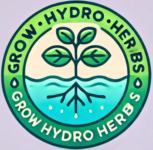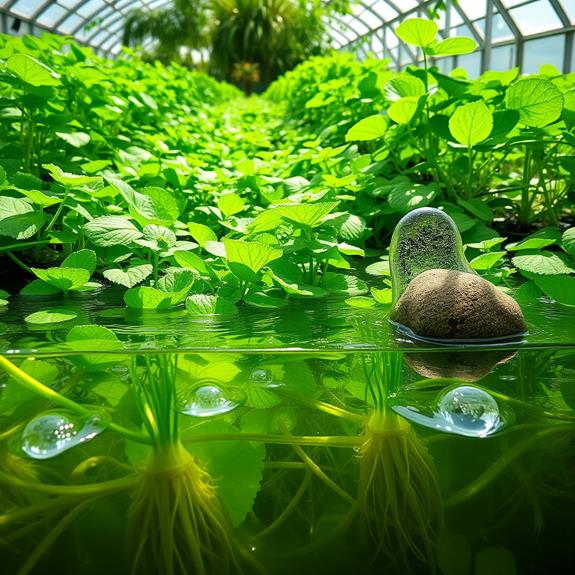Introduction to Water Quality in Hydroponic Systems
Water quality is a critical factor in hydroponics that can make or break the success of your hydroponic system. In a hydroponic garden, water isn’t just a medium; it’s the lifeline that delivers essential nutrients to your plants.
Understanding and managing water quality in hydroponics is vital for healthy plant growth and maximizing yields.
GrowHydroHerbs TLDR
- Water Quality Is Crucial: Poor water quality can cause nutrient deficiencies and stunt plant growth.
- Test Regularly: Regularly test your water supply for pH, EC, and contaminants like chlorine.
- Use Purified Water: Consider using reverse osmosis water to control the nutrient solution accurately.
- Monitor Nutrient Solution: Keep an eye on EC levels and adjust nutrient amounts accordingly.
- Maintain Optimal Conditions: Control water temperature and oxygen levels to promote healthy plant growth.
This article will guide you through the key aspects of water quality management in hydroponic systems, making it a must-read for anyone looking to start hydroponic farming or improve their existing setup.
What Is the Importance of Water Quality in Hydroponics?
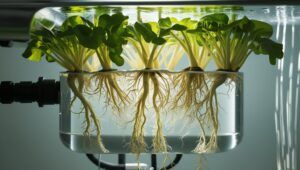
Water quality in hydroponics directly affects the health and growth of your plants. Poor water quality can cause nutrient deficiencies, stunted growth, and even diseases.
Since hydroponic systems rely solely on water to deliver nutrients, any impurities or imbalances in the water can have immediate and significant effects on plant health.
- Nutrient Uptake: High-quality water ensures efficient nutrient uptake, which is essential for plant growth.
- Avoiding Contaminants: Contaminants like chlorine and dissolved solids can shock your plants and hinder growth.
- Balancing pH and EC Levels: Proper water quality helps maintain optimal pH and electrical conductivity (EC) levels, crucial for nutrient absorption.
How Does Tap Water Affect Your Hydroponic System?
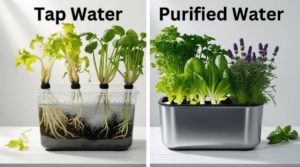
Using tap water in your hydroponic system can introduce unwanted minerals and chemicals that affect water quality. Municipal water often contains chlorine and other additives that can be harmful to plants.
- Chlorine and Chloramine: Chemicals such as chlorine can cause nutrient lockout, making it difficult for plants to absorb nutrients.
- Hard Water Issues: Tap water may be hard water, containing high levels of calcium and magnesium carbonates, which can alter pH levels.
- Testing Is Essential: It’s important to test your water supply before adding it to your hydroponics system to identify any issues.
Should You Use Reverse Osmosis Water for Hydroponics?
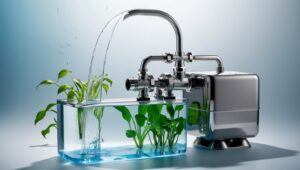
Reverse osmosis (RO) water is purified water that has had most of its dissolved minerals and salts removed. Using an RO system can significantly improve water quality in hydroponics.
- Benefits of RO Water: Provides a clean slate, allowing you to control the exact nutrient solution your plants receive.
- Cost Considerations: RO systems can be expensive, but they are a worthwhile investment for serious hydroponic growers.
- Avoiding Nutrient Imbalances: With RO water, you prevent the introduction of unwanted minerals that could affect EC levels and nutrient uptake.
Understanding EC Levels and Their Impact on Plant Growth
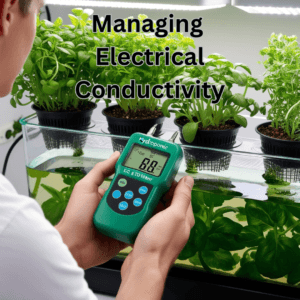
Electrical conductivity (EC) measures the ability of water to conduct electricity, which correlates with the concentration of dissolved salts (nutrients) in the water.
- Optimal EC Levels: Maintaining the right EC level is crucial for healthy plant growth; high EC can cause nutrient burn, while low EC can lead to deficiencies.
- Monitoring EC: Use an EC meter to regularly test the nutrient solution, ensuring your plants get the right amount of nutrients.
- Adjusting Nutrient Solution: If EC levels are off, adjust the amount of nutrients or dilute the solution with purified water.
What Is the Ideal Water Temperature in Hydroponic Systems?
Water temperature is a vital aspect of water quality in hydroponics, affecting oxygen levels and nutrient uptake.
- Optimal Range: The ideal water temperature for most hydroponic crops such as lettuce is between 65°F and 75°F.
- Effects of High Temperature: Warm water holds less oxygen and can promote the growth of pathogens, leading to root diseases.
- Maintaining Temperature: Use water chillers or heaters to keep the nutrient solution within the optimal temperature range.
How to Manage Water Quality in Your Hydroponic Garden
Effective water management in hydroponic systems involves regular testing and adjustment of various water quality parameters.
- Regular Testing: Test your water for pH levels, EC, and the presence of contaminants like chlorine.
- Adjusting pH Levels: Maintain a pH between 5.5 and 6.5 to ensure optimal nutrient availability.
- Using Nutrient Solutions: Choose high-quality nutrient solutions designed for hydroponics to provide all the necessary minerals.
Can Municipal Water Be Used in Hydroponic Systems?
Municipal water can be used in hydroponic systems, but it often requires treatment to make it suitable for plant growth.
- Treatment Required: Municipal water contains chemicals such as chlorine that need to be removed using filters or reverse osmosis systems.
- Testing for Hardness: Check if your municipal water is hard water, which can affect pH and EC levels.
- Pre-Filtered Water: Some growers opt for pre-filtered water to reduce the level of contaminants and dissolved solids.
Tips for Improving Hydroponic Water Quality
Improving water quality is an ongoing process that involves several best practices.
- Invest in a Reverse Osmosis System: An RO system ensures your water is pure and free from contaminants.
- Monitor and Adjust Nutrient Levels: Regularly test the nutrient solution to prevent high EC levels that can harm plants.
- Maintain Proper Oxygen Levels: Ensure there is enough oxygen in the water to support healthy root systems.
- Prevent Stagnant Water: Keep the water moving to prevent the growth of harmful bacteria and algae.
What did we learn about Water Quality In Hydroponics?
Water quality is a critical factor in hydroponics that directly impacts the success of your hydroponic garden. Since hydroponic systems rely on water to deliver essential nutrients to plants, impurities or imbalances can lead to nutrient deficiencies, stunted growth, and plant diseases.
Understanding and managing factors like pH levels, electrical conductivity (EC), and water temperature is essential for optimal plant health. Using purified water, such as from a reverse osmosis system, and regularly testing your water source can significantly enhance nutrient uptake and overall plant growth. Proper water quality management ensures your plants receive the nutrients they need for maximum yield.
By understanding and managing water quality, you can significantly enhance the success of your hydroponic garden.
Happy growing!
Questions? We Have Answers.
Get answers to a list of the most Frequently Asked Questions.
